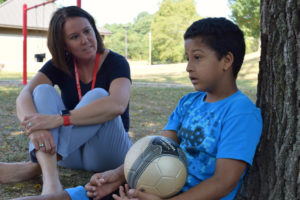As reunification is always the initial focus of the case, CASA volunteers play a vital role in not only advocating for the child, but also building a relationship with the parents, and helping them build a positive support system within their community.

The exact role a CASA plays in reunification varies case by case but often includes the following:
Service Provision: Helping the family heal and reunify requires aide from various community partners. CASA volunteers work with biological families to identify appropriate resources that support reunification including mental health services, substance abuse treatment, parenting classes, and housing.
Parent Visitation: Throughout the case, CASA volunteers will also observe visitations/interactions between the parents and child and help ensure that visits are occurring regularly to help repair and continue to build the bond between parent and child.
Residential Review: Advocates also make home visits to assess the environment and identify any safety/health concerns that may need to be addressed. The main goal is for the parents to be able to provide a safe and nurturing home for their child/children.

Partner Relationships: CASA volunteers play an integral role in their cases by collaborating with DHS, foster parents, biological parents, attorneys, and the child/children to assess the progress of the case and ensure that the child’s best interest is always being kept in mind. By maintaining these positive relationships and communicating with all parties involved, it greatly increases the opportunities for families to be reunified.
During the course of a case, it may become clear that reunification is not in the best interest of a child we serve. But, seeing a child reunify with their family is one of the brightest moments of being a CASA volunteer and highlights the important role that an advocate plays in the foster care system.

Answered by Advocate Supervisor Amanda Quillen